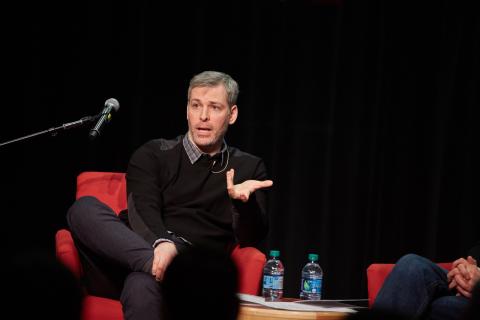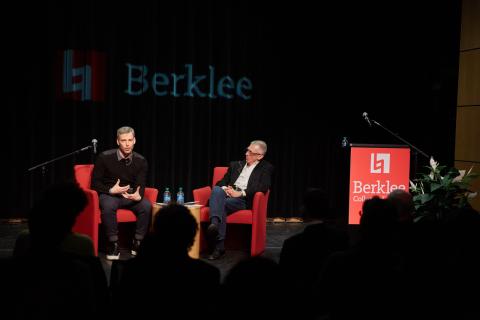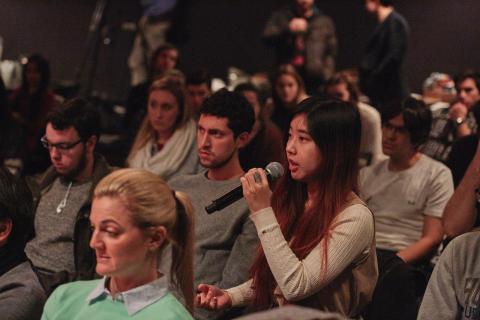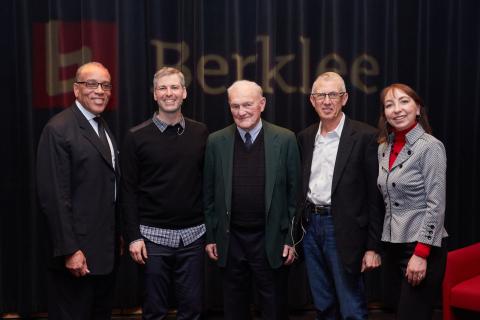Sony Music U.S. Latin President Nir Seroussi '96 Riffs on the Future of Music Labels

Nir Seroussi '96, president of Sony Music U.S. Latin, visits as the keynote speaker at the 23rd Annual James G. Zafris Lecture for Music Business/Management.
Dave Green

Don Gorder, chair of the Music Business/Management Department, interviews his former student, Nir Seroussi.
Dave Green

A Berklee student asks Seroussi a question following the keynote interview.
Dave Green

From left: John Kellogg, assistant chair of Music Business/Management; Nir Seroussi; James G. Zafris, namesake of the lecture series; Don Gorder; and Darla Hanley, dean of the Professional Education Division
Dave Green
Berklee students recently packed the David Friend Recital Hall in order to catch a couple hours of music business wisdom from Nir Seroussi ’96, the keynote speaker at the 23rd Annual James G. Zafris Lecture for Music Business/Management. Born in Israel and raised in Venezuela, Seroussi is the current president of Sony Music U.S. Latin, whose roster includes international music legends Chayanne, Gloria Estefan, Enrique Iglesias, Julio Iglesias, and Ricky Martin, among many others. Making this year’s event that much more special is the fact that Seroussi is an alumnus of the same department that sponsored the lecture.
Before Seroussi took the stage to sit for an informal but passionate and informative interview—moderated by Don Gorder, chair of the Music Business/Management Department—opening remarks were given by Darla Hanley, dean of the Professional Education Division. “It is our intention to blur the lines between education and practice, recognizing that the future of the music industry is literally in the hands of persons in this very room,” she said, drawing on the self-evident proof that in the years before Seroussi took the reins at Sony Music U.S. Latin, he was a student on the other side of the stage, just like those in attendance.
Seroussi immediately set a humble and casual tone, effusively thanking Gorder and other faculty in attendance, such as Peter Alhadeff and Ed Blomquist, who had a profound effect on how his career path emerged. Here are some key quotes from Seroussi’s Q&A under the theme of “Artists and Labels: Reinventing the Relationship.”
On what he gained as a music business/management major at Berklee:
“Taking Jay’s [Fialkov] class Legal Aspects [of the Music Industry]—that just put perspective on things and made me understand all the moving parts. Jay was such a fundamental part of all that, and was very, very insightful.”
“Believe me, a lot of the things that you’re learning you’re not going to grasp until you leave. Now looking back, I can really identify the moments that defined me. And also, the network that you create here—I still work with a lot of the folks from back in the day.”
On the benefits of having more than one area of expertise in the music business:
“Working in music publishing got me into song plugging because it’s the most fun and the most dramatic. By doing that I developed A&R skills—you figure out the psychology behind what the artist is going to like and who are the players, because it’s all about the song. I know it sounds cheesy, but it’s all about the music, and that led me to understanding what hit-making is all about.”
“I wouldn’t be doing what I’m doing the way I’m doing it had I not been through the core music training at Berklee. It gave me the framework for songwriting and understanding the studio and arranging. It seeded that link that I have with artists—that connection with the artist at the music level is priceless.”
On working within the regional Mexican music genre before moving to pop music:
“Regional Mexican music…is anything but pop. It’s about a reflection of a certain lifestyle. It’s not about certain aesthetics that apply to the pop world. It’s all about the connection.”
“When I started working with regional Mexican music, I liked the fact that it was real. It’s not just a face and voice, but about the way that [they] speak to the people. It helped me learn to connect with people from different walks of life. You've got to know how to talk to people so that it’s a productive relationship. That’s what regional Mexican really taught me.”
On his success as president at Sony Music U.S. Latin:
“I’m a bit unorthodox because I work in different areas. What I enjoy the most, still, is the A&R side. That proximity to the artist is really my favorite part.”
“What has worked for us is, if you start with the music and focus on the artist, everything else is going to come. You have to act responsibly. The new [way of thinking] is ‘Don’t lose the passion, because that has to be there, but act responsibly.’”
“There’s a lot to be learned from the past, but you have to be looking toward the future.”
On the future of music labels and the importance of relationships:
“Labels will continue to exist as long as they continue to evolve, and as long as they focus on how they can become a better partner for the artist. Period.”
“It’s not about whether it’ll be all independent or major labels. They need to coexist. We’re not always going to be the solution, but I look back over the last four or five years and it’s like one big family. We have this unprecedented roster, and it’s not like we went out and bought these artists. It came from, ‘How do we become better?’”
“We’re kind of lucky. We’ve been able to change and we’re no longer dependent on the traditional areas of revenue. When something becomes unsustainable, you have to get off your high horse and think of another way to make things work.”
